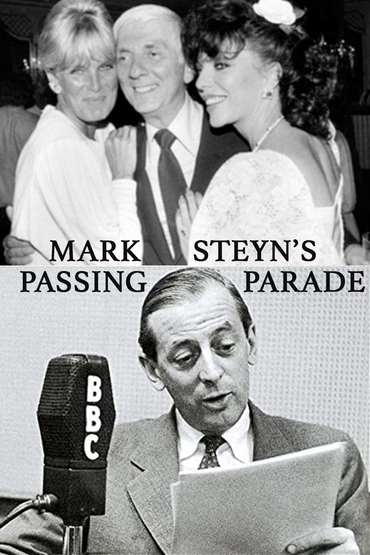Welcome to Part Six of our latest audio entertainment - my new serialization of a favorite book among Steyn readers: Mark Steyn's Passing Parade.
Last week's episode on Bob Hope prompted this memory from Doug Lauder, a First Month Founding Member of The Mark Steyn Club:
Thanks for summoning up this memory. Toronto, late August 1954, Canadian National Exhibition week, Bob Hope selling out 10k seats every nite, playing golf every day. He was scheduled at the Weston Golf one day (I believe Mark's Toronto home was a couple of miles away), I was sixteen and his designated caddy. It's a big deal for his playing partners.
He arrived at the first tee in a taxi, dressed and shoe'd ready to go. Hands were shaken , pictures were taken, off we go. He was politely aloof during the round, sauntering his patented stroll twirling a club like a baton. A loosey goosey golfer.
Upon completion of the round, the taxi was waiting. He left me with a thank you, a fiver, and this memory.
Bob Hope was "politely aloof" with a lot of people, Doug, so you got as close as many others. And at SteynOnline we have a special affection for those who caddy for iconic figures, so you're up there with P G Wodehouse's golf caddy.
In this weekend's episode of Mark Steyn's Passing Parade, I look at two contrasting lives in broadcasting - Alistair Cooke and Aaron Spelling. There are TV shows the critics hail as high art, and then there's everything else:
In between all the classics comes the stuff Aaron Spelling cranked out, year after year, decade after decade—The Mod Squad, The Love Boat, Dynasty, Beverly Hills 90210, 7th Heaven, the stuff nobody ever compares to Dickens or George Eliot. In a town where not so long ago Jerry Lewis demanded of some executive supremo, 'What do you know? You're twelve', Aaron Spelling was a hundred and twelve, give or take, and still a power. He was like Afghanistan's King Zahir at the post-Taliban loya jirga: the only old man in a land where male life expectancy is forty-three. His career stretched back to the dawn of television: he appeared in an episode of I Love Lucy, playing the pump jockey at the gas station in Bent Fork, Tennessee, to which Lucy, Ricky, Fred, and Ethel repair in order to visit Lucy's country cousin, Tennessee Ernie Ford.
Alistair Cooke's career stretched back even further. A letter of introduction from the BBC's North American Director, dated October 5th 1942:
'This is Mr Alistair Cooke, who has been travelling around the United States on an official commission from the British Broadcasting Corporation in London to collect material for and write a series of programmes on the adaptation of American life to the war, for use in the Home and Empire Services of the BBC.'
The war ended, the Home and Empire Services became Radio 4 and the World Service, and over six decades later Mr Alistair Cooke wasn't doing quite so much traveling around. But he was still on his official commission from the BBC to report on the ongoing, unceasing adaptation of American life...
He found himself a particular niche - explaining the hurly-burly of America to Britons on the Beeb, and explaining the social nuances of Britain to Americans as the host of Masterpiece Theatre. Members of The Mark Steyn Club can hear me read Part Six of Mark Steyn's Passing Parade simply by clicking here and logging-in. Earlier episodes can be found here.
If you're minded to join us in The Mark Steyn Club, you're more than welcome. You can find more information here. And, if you have a chum you think might enjoy Tales for Our Time (so far, we've covered Conan Doyle, Baroness Orczy, Dickens, Forster, Conrad, Kipling, Kafka, Gogol, Jack London, Scott Fitzgerald, Robert Louis Stevenson and more), we've introduced a special Gift Membership that lets you sign up a pal for the Steyn Club. You'll find more details here. Oh, and don't forget, over at the Steyn store, our Steynamite Special Offers include Marc Morano's new book on Green Fraud, and much more.






















